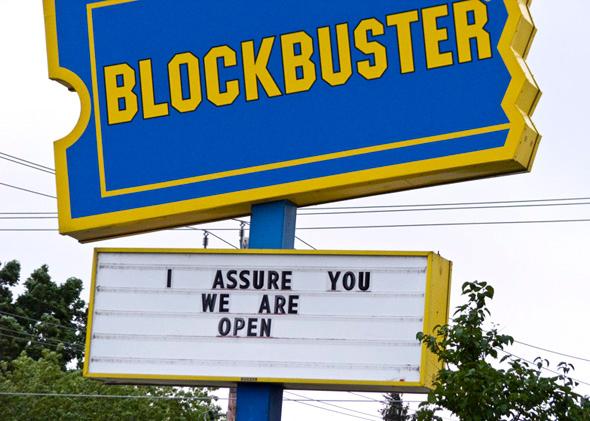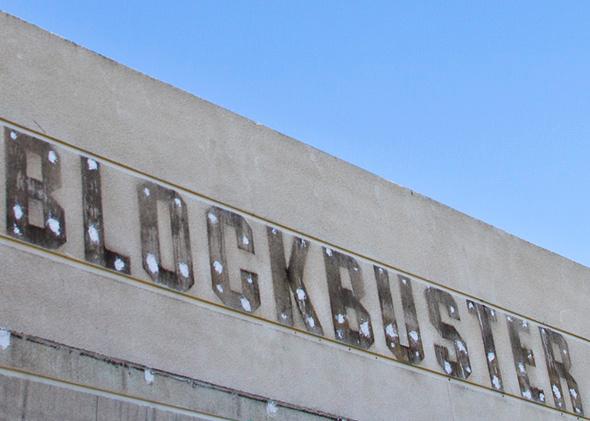Wednesday’s news that Blockbuster will be closing its remaining 300 stores early in 2014 elicited an odd blend of emotions among cinephiles of a certain demographic: a wistful not-like-we-didn’t-see-it-coming shrug, accompanied by just a hint of retroactive schadenfreude. After all, this was the crass corporate giant that, back in the late ’80s and early ’90s, had come to take away our small, independent video stores, and very nearly succeeded. Like canny mammals in the days of the dinosaurs, though, many independent establishments did continue to thrive under the early Blockbuster regime. If you were lucky enough to live in a town with a decent video store, you had a membership both there and at Blockbuster: That familiar blue-and-yellow Blockbuster card was backup, for nights you either lacked the energy to drive to the good place or just wanted to make sure you got a copy of Total Recall on its VHS release date.
The memory of being inside a Blockbuster store sets off a peculiarly oppressive set of associations. The fluorescent lighting did neither the customers, the staff, nor the movies any favors. The mammoth candy stand, with its family-sized cartons of Whoppers, made you feel depressed by your own empty acquisitiveness by the time you got through the line to check out. There was usually a fight happening somewhere, either between a couple picking a movie, a customer and a clerk, or worst of all, two clerks. There was something about those outlets, corporate monopoly aside, that just emanated bad juju.
And so … good riddance to the blue-and-yellow tyrant, I guess? But, like the once-villainized corporate bookstores that are now taking their last steps toward oblivion, the chain video rental place will leave a big (box-shaped) hole behind. As digital media delivery systems replace their analog ancestors, it will come to seem ridiculous that we ever spent our evenings carting rectangular plastic boxes from home to the video store, dropping them through a metal flap in the door if the store was closed, being kind and rewinding. But a video rental place—even Blockbuster, especially Blockbuster in a town where your entertainment options on a Friday night didn’t reach much further than that—is so much more than just a building with a bunch of plastic boxes and a cash register. It’s a place of potential encounter—with browsing or cruising or squabbling customers, with snide or surly or dazzlingly knowledgeable clerks, with the person or people you for some reason thought you could actually agree on choosing a film with, or maybe just with your own restless, vaguely movie-hungry self. Above all it’s a place of encounter with movies, a site where they’re physically arrayed around you not as icons to click on but as objects to handle, examine, discuss, and peruse. While deciding whether you want to take one home, you can carry it with you around the store like a pet, or brandish it joke-threateningly in a loved one’s face. (“Make up your mind in the next five minutes or we’re watching this again.”)

Photo courtesy Better Than Bacon/Flickr via Creative Commons
The lore of the video store as autodidacts’ film school and directorial talent incubator is well-known—Quentin Tarantino, who must surely have been both the most knowledgeable and hardest-to-shut-up clerk at the Video Archives in Manhattan Beach during his stretch there in the ’80s, is perhaps the high priest of that school. But many others have used video store jobs as what the critic Matt Singer (who worked for a year at New York’s legendary East Village video palace Kim’s, and probably rented me many a movie there—retroactive hi, Matt!) calls “an unofficial Ph.D. in cinema studies.” The writer and teacher Matt Debenham, who actually was a film student in college the year he worked at a Fitchburg, Mass., Blockbuster, told me, “I got a better education in film by working at Blockbuster than I did in my film classes.” He points out how the chain store’s very unhipness aided him in that mission: “While we only had one copy each of things like Miller’s Crossing or The Reflecting Skin, Mystery Train or School Daze, those were my copies.”
Aaron Hillis, a film critic and programmer who is also, as of last year, the owner of Video Free Brooklyn—an independent video store that is doing just fine in the heavily foot-trafficked, media-professional-crammed neighborhood of Cobble Hill—did his time at Blockbuster as well, but the video store he credits with his earliest film education is the Video Paradise, a place in the Phoenix suburbs with, in his words, “a counterintuitive layout so labyrinthine I literally got lost in there once. Like, I couldn’t find the front door. They had everything I’d ever thought to look for, even the gnarly underground freakouts that I read about in Film Threat magazine.” Now that he’s creating his own paradise, Aaron hires only “people who live and breathe cinema”—programmers, critics, filmmakers—and delights in using his intuition to help customers zero in on just what kind of title they’re looking for: “It’s almost like detective work.”
My own neighborhood video rental spot, Get Reel Video on Fifth Avenue in Brooklyn, went out of business just a few months ago—a corner of its red awning still peeks out from beneath the maroon one of the perfectly unobjectionable consignment clothing store that replaced it, making me sad every time I walk by. Get Reel wasn’t a legendary cinephiles’ mecca, just a nice, well-run local store with a smartly chosen, steadily growing selection. It almost always had what I needed for last-minute research—get me the George Clooney Batman, stat!—and the clerk I chatted with the most was a lovely young lady who blogged for film sites so hip I had never heard of them. When I mentioned the demise of Get Reel to Aaron Hillis, he told me that many of that store’s discs have made their way into the ever-growing Video Free Brooklyn collection, so maybe I’ll find my own video paradise after all.
* * *
What are your video paradises? I put out the word on Twitter that I was writing about the state of the video store in the wake of Blockbuster’s demise, and got a huge number of responses, from friends, colleagues, and strangers—some about places that had just gone out of business or were about to, some that continue, however uncertainly, to operate. Below are a few of the responses. Add your own favorite movie rental spot in the comments, or better yet, tell everyone in your neighborhood about it, and be sure to keep frequenting it yourself.
[ed. note: Anxiety in re video-clerk approval is a whole separate issue, which would require its own essay—perhaps pegged to a viewing of Nicole Holofcener’s Walking and Talking, with its hilarious and ultimately heartbreaking subplot about the Catherine Keener character’s thwarted flirtation with an enigmatic video-store clerk played by Kevin Corrigan.)
[ed. note: Reading about the struggles of this legendary store, with upward of 120,000 titles, an absurdly movie-savvy and friendly staff, and a 30-year history serving the Seattle community, was a big part of what made me want to celebrate the spirit of great video stores everywhere.]
